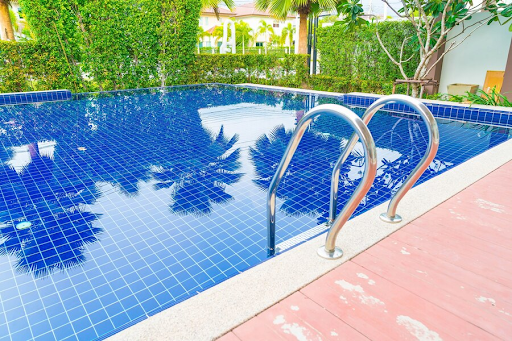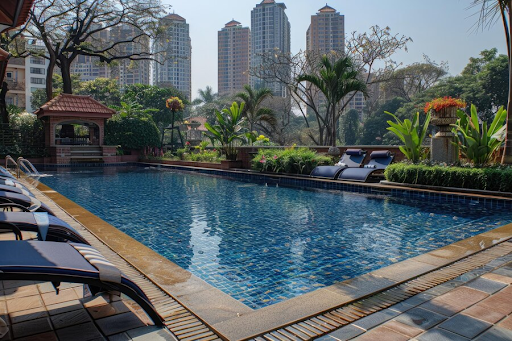Get inground pool costs for a private backyard
Installing a backyard pool, especially an inground pool, can be an exciting project for homeowners. However, it’s essential to have a clear understanding of the associated costs. The inground pools prices can vary significantly depending on factors such as size, materials, labor, and additional features.
When it comes to inground pools, the initial installation costs are the most significant. Generally, inground pool installations can range between $30,000 and $70,000. Several elements influence this wide price range, including:
Pool Size
Smaller Pools: A small pool (12’x24’) typically starts at around $30,000.
Medium-Sized Pools: Medium-sized pools (15’x30’) may cost between $35,000 and $50,000.
Large Pools: Larger pools (20’x40’ or more) often exceed $60,000.
Pool size directly impacts both material and labor costs, so determining the size of the pool is an important first step when planning your project.
The Cost Effects of Material Choices for Inground Pools
The materials used for constructing an inground pool play an important role in determining the overall backyard pool costs. There are three common materials used for inground pools:
Concrete Pools: These are the most durable and customizable pools. The flexibility to shape concrete pools to your liking adds to the cost, with starting prices generally around $50,000. However, they may require resurfacing every 10 to 15 years, which is an additional long-term expense.
Fiberglass Pools: These are pre-molded pools, delivered in one piece. They typically start at $40,000. Fiberglass pools are quick to install and require less maintenance than concrete pools, making them a more budget-friendly option over time.
Vinyl Liner Pools: These are the least expensive, starting around $30,000. However, vinyl liner pools require more frequent liner replacements, usually every 5 to 10 years, which can cost between $4,000 and $6,000 per replacement.
Budgeting for Inground Pool Maintenance: A Complete Breakdown
The initial installation of a pool is just the beginning. Routine maintenance is necessary to keep your pool clean and safe. Maintenance costs of inground pools can vary depending on the type of pool and whether you choose to handle it yourself or hire a professional service.
Water Treatment: Regularly adding chemicals, such as chlorine or salt, is necessary to maintain water quality. The annual cost for water treatment can range from $200 to $500, depending on the type of pool.
Cleaning and Filtration Systems: Pool cleaning is important to prevent algae growth and maintain clear water. Manual cleaning tools are more affordable, but many homeowners opt for automatic pool cleaners, which can cost between $300 and $1,000. The pool’s filtration system also requires regular attention, with filters needing to be replaced or cleaned frequently.
Energy Costs: Running pool pumps and heaters consumes electricity. Depending on how frequently you use your pool, the monthly energy costs can range between $50 and $300. Solar heating systems may help reduce this cost in the long run, but they come with a high initial investment.
Repairs and Replacements: Over time, pool components such as pumps, heaters, or lights will need repair or replacement. The cost for repairs can range from $500 to $5,000 over the life of your pool, depending on the materials used and how well the pool is maintained.
Improve Your Inground Pool with Valuable Features: Costs & Options"
Many homeowners choose to add additional features to their inground pools to improve their enjoyment. While these features can increase the overall backyard pool costs, they often add significant value to your property.
Heating Systems: Pool heaters extend the swimming season and add comfort. The cost of installing a heater can range from $1,000 to $4,000, depending on the type of heater (electric, gas, or solar).
Lighting: Adding lighting to your pool can create a beautiful nighttime ambiance. Basic pool lighting costs around $700 to $2,000, depending on the type and number of lights installed.
Water Features: Waterfalls, fountains, and jets can enhance the aesthetics of your pool area. The cost of water features can range from $1,500 to $5,000 or more, depending on the complexity of the design.
Pool Decking: The material you choose for the surrounding pool deck will affect both the look and cost of your pool. Concrete decks are the most affordable, starting at $6 per square foot, while natural stone or tile decks can cost up to $20 per square foot.
Affordable Ways to Pay for Your Pool Installation
Many potential clients find financing options to make inground pool installation more affordable. Some common financing methods include:
Home Equity Loans: This is a popular option for financing larger home improvement projects, like pools. Interest rates are often lower than other loan types, but it’s important to consider the long-term commitment.
Personal Loans: Personal loans from banks or credit unions can be used to finance pool installation. However, your credit score can affect interest rates.
In-House Financing: Some pool installation companies offer financing plans that allow you to spread the cost over several years.
Conclusion
Calculating the costs of installing and maintaining an inground pool is important for any homeowner considering this investment. From the initial installation costs, which range between $30,000 and $70,000, to ongoing maintenance and enhancement expenses, owning a pool requires careful planning. By knowing the factors that affect the overall cost, such as pool size, materials, and added features, you can make informed decisions that fit your budget.
Inground pools not only provide enjoyment but also increase the value of your property. Contact us today to discuss your inground pool options and get started on creating your dream space!


